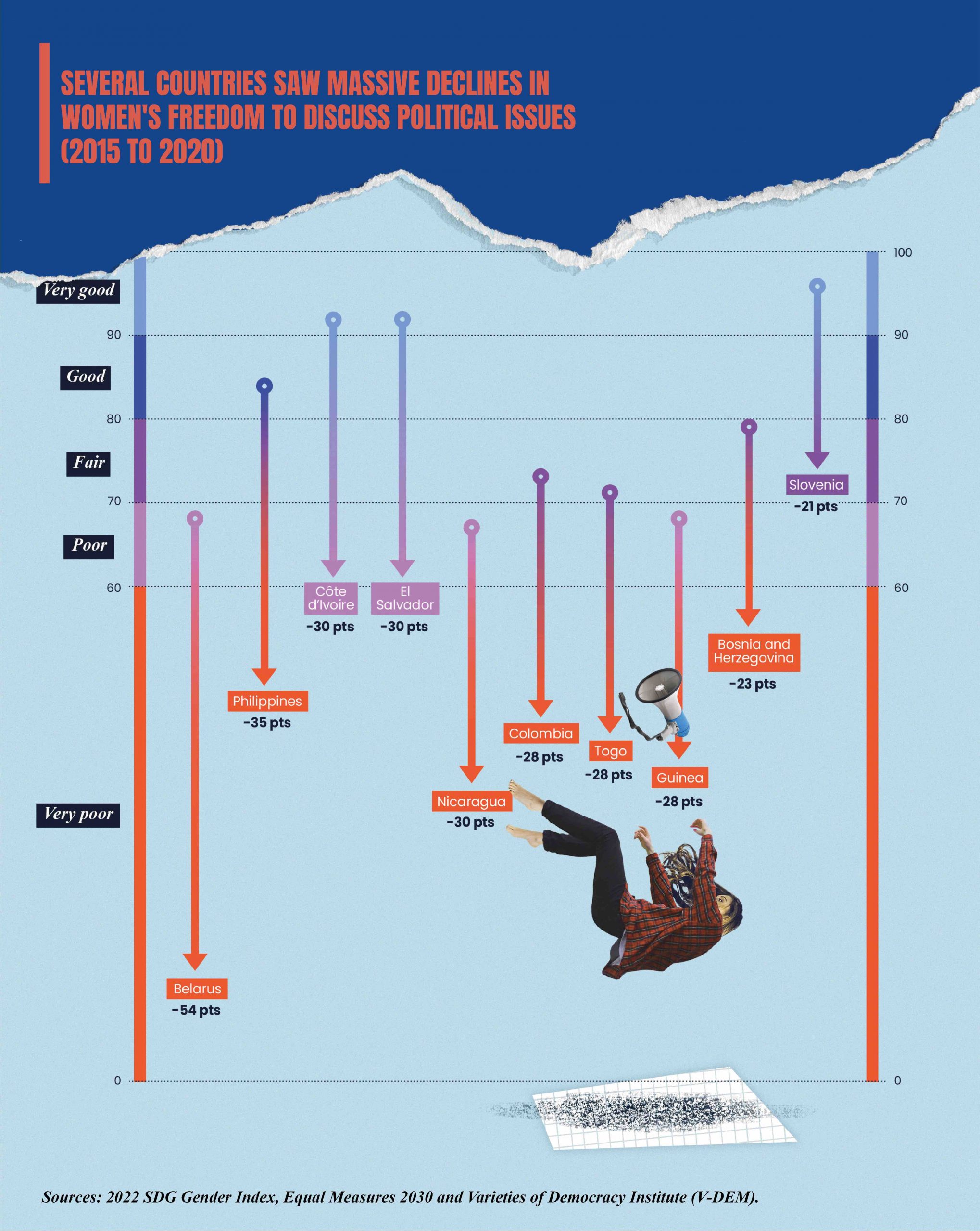Leading with Data: Our insights from Women Deliver 2023
Written by Esme Abbott, Communications Lead, Equal Measures 2030
In a world where progress towards gender equality has been limited, with only 28 countries witnessing tangible advancements*, and where the freedom for women to discuss political issues has deteriorated in recent years, gatherings like the Women Deliver 2023 conference provide a critical space for meaningful discussions, solidarity building, and fostering accountability.

Whilst Equal Measures 2030 has found that global progress towards gender equality across the Sustainable Development Goals (SDGs) is limited and slow, the data also reveals opportunities to accelerate progress.
Beyond the need to reform and enforce laws tackling inequality, and invest in public services, the data underscores the need to invest in, create space for and listen to feminist movements and the Women Deliver 2023 Conference embodies this principle.
A Milestone Gathering
With a congregation of over 6,300 advocates from 170 countries, including world leaders, grassroots advocates, youth, the private sector and government officials working on a broad range of gender equality issues, the conference aims to empower, strengthen and build solidarity amongst feminist movements, catalyse collective action and hold leaders accountable.
This year, saw the conference held on the African continent for the first time, and co-created with a global advisory committee, as Women Deliver focused on dismantling the barriers that have limited similar global convenings, such as visa restrictions. The reimagining and opening up of spaces allowed us to take the opportunity to ensure that a diverse range of voices were not just present but were actively heard and involved in shaping the discourse for a gender equal future. Aarushi Khanna, our Asia Pacific Regional Lead, captured this sentiment quite aptly
“We were thrilled to have such a strong and diverse presence with coalition partners from Asia, Africa and Latin America not only join us at the conference but also co-design our engagement at Women Deliver. With intersecting feminist principles at its core, a convening space like Women Deliver went beyond just being a big moment to amplify our collective voice but also created a platform to learn ways in which coalition partners could build more solidarity, convergence, and partnerships to strengthen our advocacy.”
Resisting the Tide of Opposition
Despite Women Deliver 2023 serving as a crucial platform for gender equality advocates to be heard and supported, our SDG Gender Index highlighted that, “for every advance for women’s voice, visibility and empowerment, we can see a ‘pushback’” and this conference was no different. The platforming of anti-rights advocates in the Opening Ceremony of Women Deliver (organized by the host country) was emblematic of the wider, global struggle of a well-funded, well-connected anti-rights movement encroaching in spaces meant to advance equality.
Whilst this situation could have been demoralizing, the instant and formidable backlash from attendees was a clear indication of the power feminist movements have when they come together.
As Delphine O, French Ambassador and Secretary General of the Generation Equality Forum, noted in our event at Women Deliver 2023, we cannot predict the future when it comes to our fight against the anti-rights, anti-choice movements, but considering our strength, in numbers, in diversity and in our passion, there is no reason to lose hope.
“It is a battle of rights, but it is also, our survival in this world, so yes I am confident, we will win this battle”
Committing to a Gender Equal Future
Whilst the anti-rights movement is increasingly well-resourced, feminist movements and women’s rights organisations are critically underfunded. It was wonderful to witness commitments move beyond words, with the Government of Canada committing more than $200 million in funding to support Sexual and Reproductive Health and Rights services, tackle inequalities in unpaid care work and end child marriage – an urgent issue as over 80 million girls could be forced to marry between now and 2030.
In addition, we saw Senegal’s President Macky Sall pledge 150 scholarships for Afghan girls attend The School of Leadership, Afghanistan (SOLA), the first and only boarding school for Afghan girls, which had to relocate to Rwanda after the Taliban returned to power.
Beyond commitments though, we need accountability and this was a key theme throughout the conference. We were proud to hear our Deputy Executive Director, Julisa Tambunan, highlight the power of data and evidence in accountability mechanisms during the plenary for Co-designing Gender Equality: The Role of Accountability in the Gender Equality Agenda.
“Data will tell us where we are making progress, helping us to spot opportunities and learn what is needed for radical progress to be possible.”
Unleashing the Power of Gender Data and Evidence-Driven Action
The emphasis on gender data emerged as a theme, not just in the plenary discussions but in the discussions we had with more than a thousand advocates visiting our booth where we used tools like our country profiles, data visualisations and gender equality calculator, to explore how our data applies to the variety of contexts attendees were working in.
Our efforts in data capacity development empower advocates, feminists, and women’s rights movements, and have resulted in a powerful community of #feministfactivists. Our Senior Data Capacity Lead, Coretta Jonah, has high hopes for the impact we saw during Women Deliver.
“We aspire for the hundreds of young advocates who’ve embraced the #feministfactivist identity through the stickers they picked at our booth to seamlessly integrate data into their daily work, becoming catalysts who amplify gender data’s impact.”
Gender data has a critical role to play in identifying where progress is and isn’t being made, and what kind of future our current efforts will deliver. Historical trends will not deliver global gender equality across the sustainable development goals until 2108!
If we took anything away from Women Deliver 2023, it is that women’s rights organizations and feminist advocates refuse to wait until 2108 for their rights! They refuse to listen to commitments be made without effective evidence-driven accountability mechanisms. They refuse to give up the fight against anti-rights movements no matter how many rights have been reversed. They refuse to be silenced.
Women Deliver 2023 offered a critical space for discussion, solidarity, and accountability in a world where progress on gender equality has been fragile and limited, and we were honored to have the privilege to attend, to raise our voice for a gender equal future and to connect with so many fierce advocates.
The struggle for gender equality goes beyond Women Deliver 2023, join us in the use of feminist factivism for a gender equal future by checking out the resources below:
Explore our SDG Gender Index for a snapshot of global progress towards gender equality across the SDGs between 2015 and 2020.
Explore our country profiles or our interactive gender equality calculator to see where progress on gender equality is at in your country.
Follow us on Twitter, LinkedIn, Instagram and Facebook, or sign up to our newsletter to stay up to date on a range of gender equality issues, our data and upcoming events!
*Tangible advancements refer to the 28 out of 135 countries we saw make ‘some progress’ between 2015 and 2020 in our 2022 SDG Gender Index – this is progress where their Index score increased by more than one point. You can learn more about our Index scoring here.



